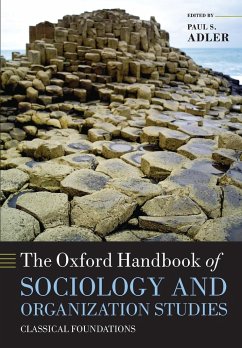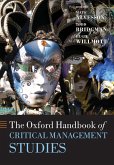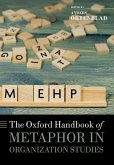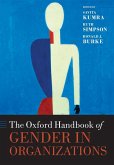Paul S. AdlerClassical Foundations
The Oxford Handbook of Sociology and Organization Studies
Classical Foundations
Herausgegeben von Adler, Paul S.
Paul S. AdlerClassical Foundations
The Oxford Handbook of Sociology and Organization Studies
Classical Foundations
Herausgegeben von Adler, Paul S.
- Broschiertes Buch
- Merkliste
- Auf die Merkliste
- Bewerten Bewerten
- Teilen
- Produkt teilen
- Produkterinnerung
- Produkterinnerung
This Handbook re-asserts the importance of classical sociology as a rich source of insight for contemporary work in Organization Studies, and demonstrates the way in which these pioneers were deeply engaged with practical, social, and political issues of their time, compared with the increasingly academic focus of research in more recent decades.
Andere Kunden interessierten sich auch für
![The Oxford Handbook of Critical Management Studies The Oxford Handbook of Critical Management Studies]() The Oxford Handbook of Critical Management Studies74,99 €
The Oxford Handbook of Critical Management Studies74,99 €![The Oxford Handbook of Metaphor in Organization Studies The Oxford Handbook of Metaphor in Organization Studies]() Anders ÖrtenbladThe Oxford Handbook of Metaphor in Organization Studies188,99 €
Anders ÖrtenbladThe Oxford Handbook of Metaphor in Organization Studies188,99 €![The Oxford Handbook of Inter-Organizational Relations The Oxford Handbook of Inter-Organizational Relations]() The Oxford Handbook of Inter-Organizational Relations78,99 €
The Oxford Handbook of Inter-Organizational Relations78,99 €![The Oxford Handbook of Regulation The Oxford Handbook of Regulation]() The Oxford Handbook of Regulation228,99 €
The Oxford Handbook of Regulation228,99 €![The Oxford Handbook of Conflict Management in Organizations The Oxford Handbook of Conflict Management in Organizations]() The Oxford Handbook of Conflict Management in Organizations61,99 €
The Oxford Handbook of Conflict Management in Organizations61,99 €![The Oxford Handbook of Gender in Organizations The Oxford Handbook of Gender in Organizations]() The Oxford Handbook of Gender in Organizations60,99 €
The Oxford Handbook of Gender in Organizations60,99 €![The Oxford Handbook of Human Resource Management The Oxford Handbook of Human Resource Management]() The Oxford Handbook of Human Resource Management78,99 €
The Oxford Handbook of Human Resource Management78,99 €-
-
-
This Handbook re-asserts the importance of classical sociology as a rich source of insight for contemporary work in Organization Studies, and demonstrates the way in which these pioneers were deeply engaged with practical, social, and political issues of their time, compared with the increasingly academic focus of research in more recent decades.
Hinweis: Dieser Artikel kann nur an eine deutsche Lieferadresse ausgeliefert werden.
Hinweis: Dieser Artikel kann nur an eine deutsche Lieferadresse ausgeliefert werden.
Produktdetails
- Produktdetails
- Oxford Handbooks in Business and Management
- Verlag: Oxford University Press
- Seitenzahl: 700
- Erscheinungstermin: 16. Juli 2013
- Englisch
- Abmessung: 244mm x 170mm x 38mm
- Gewicht: 1210g
- ISBN-13: 9780199593811
- ISBN-10: 0199593817
- Artikelnr.: 30178499
- Herstellerkennzeichnung
- Libri GmbH
- Europaallee 1
- 36244 Bad Hersfeld
- gpsr@libri.de
- Oxford Handbooks in Business and Management
- Verlag: Oxford University Press
- Seitenzahl: 700
- Erscheinungstermin: 16. Juli 2013
- Englisch
- Abmessung: 244mm x 170mm x 38mm
- Gewicht: 1210g
- ISBN-13: 9780199593811
- ISBN-10: 0199593817
- Artikelnr.: 30178499
- Herstellerkennzeichnung
- Libri GmbH
- Europaallee 1
- 36244 Bad Hersfeld
- gpsr@libri.de
Professor Adler began his education in Australia and moved to France in 1974. He received his doctorate in economics and management there while working as a Research Economist for the French government. He came to the USA in 1981, and before arriving at USC in 1991, he was affiliated with the Brookings Institution, Columbia University, the Harvard Business School, and Stanford's School of Engineering. His research and teaching focus on organization theory and design, strategic management and human resource management in R&D, engineering, software, healthcare, and manufacturing operations. He has served as chair of the Technology and Innovation Management Division and the Critical Management Studies Interest Group of the Academy of Management, and he has published widely in academic and managerial journals both in the U.S. and overseas. His most recent book was The Firm as a Collaborative Community: Reconstructing Trust in the Knowledge Economy (OUP, 2006).
* Part I: The Role of the Classics
* 1: Paul Adler: Introduction: A Social Science which Forgets its
Founders is Lost
* 2: Patricia H. Thornton: The Value of the Classics
* Part II: European Perspectives
* 3: Richard Swedburg: Tocqueville as a Pioneer in Organization Theory
* 4: Paul Adler: Marx and Organization Studies Today
* 5: Richard Marens: It's Not Just for Communists any More: Marxian
Political Economy and Organizational Theory
* 6: Stewart Clegg and Michael Lounsbury: Weber:Sintering the Iron
Cage: Translation, Domination, and Rationality
* 7: Paul du Gay: Max Weber and the Ethics of Office
* 8: Pamela S. Tolbert and Shon R. Hiatt: On Organizations and
Oligarchies: Michels in 21st Century
* 9: Frank Dobbin: How Durkheim's Theory of Meaning-making Influenced
Organizational Sociology
* 10: Paul Hirsch, Peer Fiss, and Amanda Hoel-Green: A Durkheimian
Approach to Globalization
* 11: Barbara Czarniawska: Gabriel Tarde and Organization Theory
* 12: Alan Scott: Georg Simmel: The Individual and the Organization
* 13: Rosabeth Moss Kanter and Rakesh Khurana: Types and Positions: The
Significance of Georg Simmel's Structural Theories for Organizational
Behavior
* 14: Markus C. Becker and Thorbjørn Knudsen: Schumpeter and the
Organization of Entrepreneurship
* 15: Ad van Iterson: Norbert Elias's Impact on Organization Studies
* Part III: American Perspectives
* 16: Gary G. Hamilton and Misha Petrovic: Thorstein Veblen and the
Organization of the Capitalist Economy
* 17: Stella M. Nkomo: The Sociology of Race: The Contributions of W.
E. B. Du Bois
* 18: Andrew Abbott: Organizations and the Chicago School
* 19: Arne Carlsen: After James on Identity
* 20: Michael D. Cohen: Reading Dewey: Some Implications for the Study
of Routine
* 21: Christopher Ansell: Mary Parker Follett and Pragmatist
Organization
* 22: Tim Hallett, David Shulman, and Gary Alan Fine: Peopling
Organizations: The Promise of Classic Symbolic Interactionism for an
Inhabited Institutionalism
* 23: Andrew Van de Ven and Arik Lifschitz: John R. Commons: Back to
the Future of Organization Studies
* 24: Elisabeth S. Clemens: The Problem of the Corporation: Liberalism
and the Large Organization
* 25: Michael Reed: Bureaucratic Theory and Intellectual Renewal in
Contemporary Organization Studies
* 26: Heather Haveman: The Columbia School and the Study of
Organizations: Why Organizations Have Lives of Their Own
* 27: Charles Heckscher: Parsons as an Organization Theorist
* Part IV: Afterword
* 28: Gerald Davis and Mayer N. Zald: Afterword: Sociological Classics
and the Canon in the Study of Organizations
* 1: Paul Adler: Introduction: A Social Science which Forgets its
Founders is Lost
* 2: Patricia H. Thornton: The Value of the Classics
* Part II: European Perspectives
* 3: Richard Swedburg: Tocqueville as a Pioneer in Organization Theory
* 4: Paul Adler: Marx and Organization Studies Today
* 5: Richard Marens: It's Not Just for Communists any More: Marxian
Political Economy and Organizational Theory
* 6: Stewart Clegg and Michael Lounsbury: Weber:Sintering the Iron
Cage: Translation, Domination, and Rationality
* 7: Paul du Gay: Max Weber and the Ethics of Office
* 8: Pamela S. Tolbert and Shon R. Hiatt: On Organizations and
Oligarchies: Michels in 21st Century
* 9: Frank Dobbin: How Durkheim's Theory of Meaning-making Influenced
Organizational Sociology
* 10: Paul Hirsch, Peer Fiss, and Amanda Hoel-Green: A Durkheimian
Approach to Globalization
* 11: Barbara Czarniawska: Gabriel Tarde and Organization Theory
* 12: Alan Scott: Georg Simmel: The Individual and the Organization
* 13: Rosabeth Moss Kanter and Rakesh Khurana: Types and Positions: The
Significance of Georg Simmel's Structural Theories for Organizational
Behavior
* 14: Markus C. Becker and Thorbjørn Knudsen: Schumpeter and the
Organization of Entrepreneurship
* 15: Ad van Iterson: Norbert Elias's Impact on Organization Studies
* Part III: American Perspectives
* 16: Gary G. Hamilton and Misha Petrovic: Thorstein Veblen and the
Organization of the Capitalist Economy
* 17: Stella M. Nkomo: The Sociology of Race: The Contributions of W.
E. B. Du Bois
* 18: Andrew Abbott: Organizations and the Chicago School
* 19: Arne Carlsen: After James on Identity
* 20: Michael D. Cohen: Reading Dewey: Some Implications for the Study
of Routine
* 21: Christopher Ansell: Mary Parker Follett and Pragmatist
Organization
* 22: Tim Hallett, David Shulman, and Gary Alan Fine: Peopling
Organizations: The Promise of Classic Symbolic Interactionism for an
Inhabited Institutionalism
* 23: Andrew Van de Ven and Arik Lifschitz: John R. Commons: Back to
the Future of Organization Studies
* 24: Elisabeth S. Clemens: The Problem of the Corporation: Liberalism
and the Large Organization
* 25: Michael Reed: Bureaucratic Theory and Intellectual Renewal in
Contemporary Organization Studies
* 26: Heather Haveman: The Columbia School and the Study of
Organizations: Why Organizations Have Lives of Their Own
* 27: Charles Heckscher: Parsons as an Organization Theorist
* Part IV: Afterword
* 28: Gerald Davis and Mayer N. Zald: Afterword: Sociological Classics
and the Canon in the Study of Organizations
* Part I: The Role of the Classics
* 1: Paul Adler: Introduction: A Social Science which Forgets its
Founders is Lost
* 2: Patricia H. Thornton: The Value of the Classics
* Part II: European Perspectives
* 3: Richard Swedburg: Tocqueville as a Pioneer in Organization Theory
* 4: Paul Adler: Marx and Organization Studies Today
* 5: Richard Marens: It's Not Just for Communists any More: Marxian
Political Economy and Organizational Theory
* 6: Stewart Clegg and Michael Lounsbury: Weber:Sintering the Iron
Cage: Translation, Domination, and Rationality
* 7: Paul du Gay: Max Weber and the Ethics of Office
* 8: Pamela S. Tolbert and Shon R. Hiatt: On Organizations and
Oligarchies: Michels in 21st Century
* 9: Frank Dobbin: How Durkheim's Theory of Meaning-making Influenced
Organizational Sociology
* 10: Paul Hirsch, Peer Fiss, and Amanda Hoel-Green: A Durkheimian
Approach to Globalization
* 11: Barbara Czarniawska: Gabriel Tarde and Organization Theory
* 12: Alan Scott: Georg Simmel: The Individual and the Organization
* 13: Rosabeth Moss Kanter and Rakesh Khurana: Types and Positions: The
Significance of Georg Simmel's Structural Theories for Organizational
Behavior
* 14: Markus C. Becker and Thorbjørn Knudsen: Schumpeter and the
Organization of Entrepreneurship
* 15: Ad van Iterson: Norbert Elias's Impact on Organization Studies
* Part III: American Perspectives
* 16: Gary G. Hamilton and Misha Petrovic: Thorstein Veblen and the
Organization of the Capitalist Economy
* 17: Stella M. Nkomo: The Sociology of Race: The Contributions of W.
E. B. Du Bois
* 18: Andrew Abbott: Organizations and the Chicago School
* 19: Arne Carlsen: After James on Identity
* 20: Michael D. Cohen: Reading Dewey: Some Implications for the Study
of Routine
* 21: Christopher Ansell: Mary Parker Follett and Pragmatist
Organization
* 22: Tim Hallett, David Shulman, and Gary Alan Fine: Peopling
Organizations: The Promise of Classic Symbolic Interactionism for an
Inhabited Institutionalism
* 23: Andrew Van de Ven and Arik Lifschitz: John R. Commons: Back to
the Future of Organization Studies
* 24: Elisabeth S. Clemens: The Problem of the Corporation: Liberalism
and the Large Organization
* 25: Michael Reed: Bureaucratic Theory and Intellectual Renewal in
Contemporary Organization Studies
* 26: Heather Haveman: The Columbia School and the Study of
Organizations: Why Organizations Have Lives of Their Own
* 27: Charles Heckscher: Parsons as an Organization Theorist
* Part IV: Afterword
* 28: Gerald Davis and Mayer N. Zald: Afterword: Sociological Classics
and the Canon in the Study of Organizations
* 1: Paul Adler: Introduction: A Social Science which Forgets its
Founders is Lost
* 2: Patricia H. Thornton: The Value of the Classics
* Part II: European Perspectives
* 3: Richard Swedburg: Tocqueville as a Pioneer in Organization Theory
* 4: Paul Adler: Marx and Organization Studies Today
* 5: Richard Marens: It's Not Just for Communists any More: Marxian
Political Economy and Organizational Theory
* 6: Stewart Clegg and Michael Lounsbury: Weber:Sintering the Iron
Cage: Translation, Domination, and Rationality
* 7: Paul du Gay: Max Weber and the Ethics of Office
* 8: Pamela S. Tolbert and Shon R. Hiatt: On Organizations and
Oligarchies: Michels in 21st Century
* 9: Frank Dobbin: How Durkheim's Theory of Meaning-making Influenced
Organizational Sociology
* 10: Paul Hirsch, Peer Fiss, and Amanda Hoel-Green: A Durkheimian
Approach to Globalization
* 11: Barbara Czarniawska: Gabriel Tarde and Organization Theory
* 12: Alan Scott: Georg Simmel: The Individual and the Organization
* 13: Rosabeth Moss Kanter and Rakesh Khurana: Types and Positions: The
Significance of Georg Simmel's Structural Theories for Organizational
Behavior
* 14: Markus C. Becker and Thorbjørn Knudsen: Schumpeter and the
Organization of Entrepreneurship
* 15: Ad van Iterson: Norbert Elias's Impact on Organization Studies
* Part III: American Perspectives
* 16: Gary G. Hamilton and Misha Petrovic: Thorstein Veblen and the
Organization of the Capitalist Economy
* 17: Stella M. Nkomo: The Sociology of Race: The Contributions of W.
E. B. Du Bois
* 18: Andrew Abbott: Organizations and the Chicago School
* 19: Arne Carlsen: After James on Identity
* 20: Michael D. Cohen: Reading Dewey: Some Implications for the Study
of Routine
* 21: Christopher Ansell: Mary Parker Follett and Pragmatist
Organization
* 22: Tim Hallett, David Shulman, and Gary Alan Fine: Peopling
Organizations: The Promise of Classic Symbolic Interactionism for an
Inhabited Institutionalism
* 23: Andrew Van de Ven and Arik Lifschitz: John R. Commons: Back to
the Future of Organization Studies
* 24: Elisabeth S. Clemens: The Problem of the Corporation: Liberalism
and the Large Organization
* 25: Michael Reed: Bureaucratic Theory and Intellectual Renewal in
Contemporary Organization Studies
* 26: Heather Haveman: The Columbia School and the Study of
Organizations: Why Organizations Have Lives of Their Own
* 27: Charles Heckscher: Parsons as an Organization Theorist
* Part IV: Afterword
* 28: Gerald Davis and Mayer N. Zald: Afterword: Sociological Classics
and the Canon in the Study of Organizations








